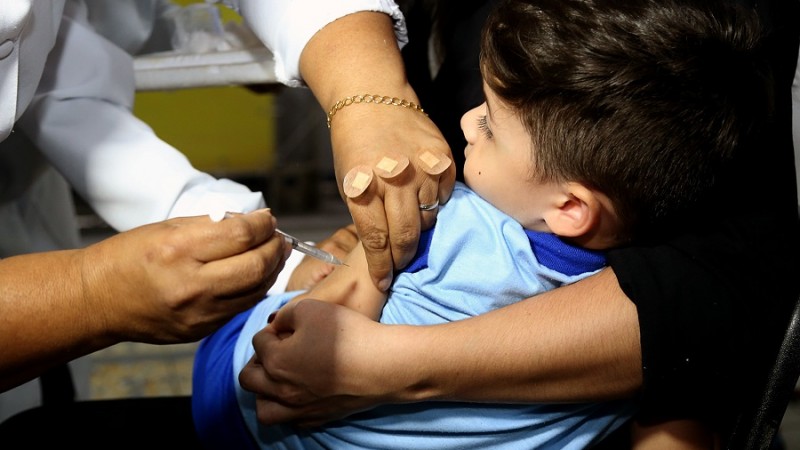
[ad_1]
Outlining strategies to reverse the low vaccination coverage of the National Polio Vaccination Campaign and Multivaccination was the goal of the Secretariat of Health (SES) by bringing together leaders from state municipalities with lower rates of vaccine application.
Secretary Arita Bergmann and the directors spoke by videoconference with the municipal health secretaries and regional coordinators of 25 municipalities with a population of over 50,000 people and polio vaccination coverage of less than 55%. “The Covid-19 vaccine is much discussed, but we fail to achieve the goal of vaccinating the diseases we already have all the inputs and all the information about,” said Arita. “This Tuesday, we have 60% vaccination coverage, a far cry from the desired 95%.”
The national polio vaccination campaign and the multivaccination campaign were closed nationwide on October 30, but the state government decided to extend them to Rio Grande do Sul until November 21. “We can still achieve the goal. We believe that by combining efforts and strengthening the importance of vaccination among the population, it will be possible to improve vaccination coverage in the state, ”Arita strengthened.
Each municipality has the autonomy to define strategies for the diffusion and expansion of access that best suit the reality and needs of its population. Among the suggestions raised are, among other actions:
• take droplet vaccination in places of greater movement such as squares;
• extend the opening of health posts beyond working hours;
• take advantage of the visit of children to health centers for other reasons, such as consultations, to carry out the vaccine and check if there are other backward vaccines on the calendar;
• use local personalities and media to disseminate information;
• reorganize the vaccination sites to make the population feel safe from Covid-19;
• actively seek out children and adolescents who need to receive a vaccine through Family Health Strategies (FHS) teams or other health agents;
• Accessible by car;
• new D-Days (Saturday when the stations remain open exclusively for vaccination).
The head of the Epidemiological Surveillance Division of the State Health Surveillance Center (Cevs), Tani Ranieri, recalled that the vaccines available in the basic vaccination calendar have changed the global epidemiological scenario, making rare or eradicating diseases previously common. “But we must continue to vaccinate our children so that these diseases, such as polio, do not recur, as happened with measles, which has been circulating in the state for three years. Children are the group of the population that gets sick the most, ”he explained. Secretary Arita stressed that the act of vaccinating the child is not only an individual protection action, but also a collective one.
He is D.
The state government has established that an extra D-Day will be held on November 21 in the state of Rio Grande do Sul, allowing municipalities to organize more D-Days, based on the availability of each manager and their teams. In these days the health posts remain open for the application of vaccines.
Vaccine schedule
The polio vaccination program currently consists of two vaccines: the injectable vaccine applied in three doses at two, four and six months of the child’s life, and the oral vaccine given at 15 months and four years. In this campaign, all children of this age group will have their polio vaccination status assessed. Those over one year of age who have updated their vaccination schedule will receive a dose of the oral vaccine, called dose D (indiscriminate). For children with delayed polio vaccination schedules, there will be an update.
The Multivaccination Campaign, in turn, aims to update the vaccination situation of the population up to 15 years of age, according to the indications of the National Vaccination Calendar. In addition to increasing vaccination coverage, the goal is to reduce or control the incidence of immunopreventable diseases, such as tuberculosis, hepatitis, tetanus, meningitis, pneumonia and others. As it is a strategy to update expired schemes, the objectives are not met. The assessment will be carried out on the basis of the doses applied and recorded in the information systems during the period.
COVID-19
Tani Ranieri stresses that all health posts are following security measures to prevent the contagion of Covid-19. “The health units are ready to welcome citizens,” he adds.
Research
Research conducted by SES last year showed that the main causes of low vaccination coverage in the state are due to neglect and misinformation. In the survey, 59% of people indicated personal reasons for not vaccinating their children, such as forgetfulness, fear of side effects and lack of time. Even if for some reason they did not vaccinate the children, more than 96% said they believe in immunization and consider it important. Only 4% said they did not believe in the efficacy of the doses.
It has also been found that young people stop vaccinating their children more often because in other times they did not live with certain common diseases and which have long since disappeared, but which today are making a strong comeback. Measles is an example.
Source link